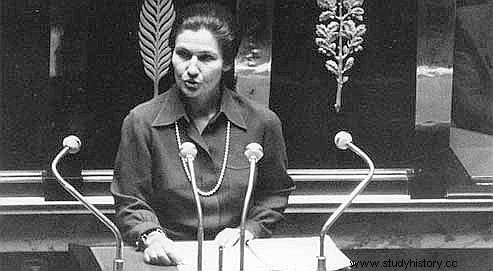Simone Jacob became Simone Veil (1927 – 2017) is a French politician, known in particular for having passed the law decriminalizing the voluntary termination of pregnancy.
Deportation to Auschwitz-Birkenau
Born in Nice on July 13, 1927, Simone Jacob is the fourth child of Yvonne Steinmetz, a chemistry student who gave up her studies to get married, and André Jacob, an architect. In 1940, when Simone was thirteen, the Vichy regime enacted a series of bans on Jews and André Jacob lost the right to practice his profession. The Jacobs, who called themselves Jacquiers, suffered increasingly strong segregation and their existence became even more risky when the German occupiers took control of the area in September 1943.
On March 28, 1944, hosted by a literature teacher, Simone passed her baccalaureate. Two days later, she was checked in the street by two SS men and taken into custody. Within hours, the Gestapo arrested the rest of his family, including his sister Denise, who had entered the resistance. Deported to Lithuania, his father and his brother Jean will not return. On April 15, 1944, Yvonne Jacob, Simone and her sister Madeleine arrived at the Auschwitz-Birkenau extermination camp.
Upon her arrival, a prisoner advises Simone to say she is over eighteen to avoid extermination. She was then compelled to do forced labor consisting, among other things, of unloading stones and digging trenches. In July, the three women were transferred to Bobrek and then to Bergen-Belsen in January 1945. Yvonne Jacob died of typhus on March 15, 1945. Also ill, Madeleine survived thanks to the liberation of the camp by British troops on April 15, 1945. Simone, Madeleine and Denise, deported to Ravensbrück, are the only survivors of the Jacob family.
Voluntary termination of pregnancy
 Back in France, Simone Veil obtained a law degree and a diploma from the Institute of Political Studies from Paris. During her studies, she met Antoine Veil, who would become a finance inspector and business manager. They married on October 26, 1946 and had three sons:Jean, Claude-Nicolas and Pierre-François. In 1956, Simone passed the judicial examination and became a senior official in the prison administration at the Ministry of Justice. In 1970, she became secretary general of the Superior Council of the Judiciary.
Back in France, Simone Veil obtained a law degree and a diploma from the Institute of Political Studies from Paris. During her studies, she met Antoine Veil, who would become a finance inspector and business manager. They married on October 26, 1946 and had three sons:Jean, Claude-Nicolas and Pierre-François. In 1956, Simone passed the judicial examination and became a senior official in the prison administration at the Ministry of Justice. In 1970, she became secretary general of the Superior Council of the Judiciary.
In May 1974, Valéry Giscard d'Estaing was elected President of the French Republic and Simone was appointed Minister of Health in the Chirac government. After the explosion caused by the manifesto of the 343, she is responsible for presenting to Parliament the bill which decriminalizes voluntary termination of pregnancy (IVG). The text was presented in November 1974 and the debates that followed were terribly violent. Simone Veil suffered a shower of insults, attacks and even threats, but she held firm and the text was adopted in the National Assembly on November 29, 1974 before being adopted in the Senate two weeks later. The law comes into force on January 17, 1975.
Political career
In 1979, following the UDF's good results in the European elections, Simone Veil left the government. On July 17, 1979, she was elected President of the European Parliament. In 1982, she sought a second term before withdrawing her candidacy. In the European elections of 1984, during the presidency of François Mitterrand, she presented a single opposition list with Jacques Chirac and obtained 43.02% of the vote. In 1989, it presented a centrist list distinct from the RPR/UDF union list.
In March 1993, Simone Veil was appointed Minister of State, Minister of Social Affairs, Health and the City in the Balladur government then left the government in 1995, after the election of Jacques Chirac. In March 1998, she was appointed a member of the Constitutional Council by the President of the Senate.
From 2000 to 2007, Simone chaired the Foundation for the Memory of the Shoah. In 2007, his autobiography, Une vie , is published. The same year, she announced her support for Nicolas Sarkozy for the presidential election, while expressing reservations on certain points of her program such as the creation of a Ministry of Immigration and National Identity. On November 20, 2008, she was elected to the French Academy. The 1 st January 2009, she was promoted to the distinction of Grand Officer of the Legion of Honor, without going through the lower ranks.
In 2010, polls show Simone Veil as the favorite woman of the French.
Simone Veil died at the age of 89 on June 30, 2017.
